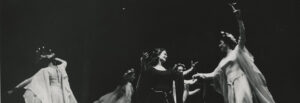
As a grandmother she loved her grandchildren dearly and fulfilled all their wishes and supported their lives, whenever she could. When they were babies she loved so much to bathe and cuddle them, and was proud to be a grandmother. When they were small, they loved to sleep in her bed when they stayed overnight and listen to stories she told them. Alyssa loved to see her on stage, she adored her voice and she misses so much to hug and speak with her.
Edita’s devotion to children extended outward, too. Observe her endearing, tender interaction with the children (daughter Klaudia among them) at the end of the 1981 Unitel film of Humperdinck’s Hänsel und Gretel, and in which she based her own adorable performance on her experience as a mother to her own children:
In 1992, in an astonishing, incredible feat, she recorded a CD entitled “Children’s Songs of the World, in which she learned nearly 30 languages of like countries. Edita’s devotion to this project was of consecrating importance, as it was for her the greatest labor of love, she told me, of nearly all her recordings:By the time Edita retired, all the trying aspects of her earlier life had been by then long vanquished and settled, the pressures of the career gone. Her intents on seeing that her daughters had better lives than she had been fulfilled. Klaudia became a teacher of German to expats, and Barbara is an author and director. Of her grandchildren, Cris is a true renaissance man, devoted to collecting music on vinyl, with special interest in The Beatles, Led Zeppelin, Madonna, and Prince. Denis is into video gaming, cats, and tattoos. Alyssa, the youngest, loves to read and draw.Edita’s last wishes, regarding her will and affects, were entirely consistent with the woman I knew. In fact, many aspects to her fundamental self that I had absorbed from years of spending much time with, observation of, and interviewing her, were borne and brought out to further light and clarity.
She specified no funeral and no grave marker. Her remains are buried in an undisclosed location, among trees, out in nature, with where she felt most aligned. Owing to her humble nature, Edita did not want, therefore did not “set up” in advance a grave-shrine to her artistic persona. Opera has her legacy: but her self belonged to herself and her family – whatever anyone or institution wanted to do in terms of remembering her she left to the jurisdiction of those who wanted to pursue such endeavors after the fact.
In September of this year, an auction was set up in Vienna of a significant bulk of Edita’s effects and estate. Her piano, costumes, concert dresses, jewelry, awards of honor, art, furnishings, artwork, paintings of her, and various other sundry items were put up for sale.
A minor scandal arose from outraged fans and commentators, who strenuously objected and felt that Edita’s family were ruthlessly disposing of an entire legacy of their mother’s career. That many of the costumes and such should go to a museum.
This action taken by the family was entirely in keeping with Edita’s wishes. It is somewhat of a challenge to fully explain and elaborate on these factors, but Edita was one of the most practical, least-materialistic of people I have ever known. Though she loved beautiful things, she had an utter detachment from all the markers of recognition, the material effects that were tied to her artistic self and career.
I have to emphatically reinforce just how stringently she separated the private civilian and mother from her performance career. All the honors, awards, paintings, sculptures of her she received with gracious, humble gratitude, but she also did not want herself or her family to reside in a virtual Sunset Boulevard museum, and post-mortem, a mausoleum of a bygone career. Her lack of ego in this realm, of the high-flown and self-preening world of opera was, I can affirm, truly epic. She observed too many in her experience who believed in their own publicity and became self-made and self-vaunted sacred monsters.
Whatever her daughters did not want, or had no room for (they do not live in mansions to house all this stuff), her firm stance was: sell it all. Sell it, because Edita, acutely knowing the value of money from having precious little of it in her earlier years, worked her tail off and paid the high prices of her belongings: If anyone wanted anything of hers, they can buy them. If she could have somehow known of the questioning of her intents and purposes, she’d have been furious.
People really have no idea of the costs of being an international performing artist, what with travel expenses, wardrobes, taxes, management fees, living costs, etc. Royalties from opera recordings actually provide very little. She would have expected remuneration for all that she worked for, and her daughters to be the beneficiaries.
As it turned out, the auction sold out in short order, and the touching responses of those who had purchased mementos of their beloved artist is exactly what Edita would have wanted. The Slovak National Museum in Bratislava purchased several gowns and medals, and private collectors won out, too.
Edita continues to be ever-present in my thoughts, and I expect her to remain so until the end of my days. She not only changed singing and music as I knew it, but she changed and determined the course of my adult life. Allowed and gave me the big break and honor of representing her through my book. I discovered that I was as much affected by her art as I was by her, personally.
She was one of the most fascinating individuals I have ever known. Complex, mysterious in some ways, yet an open book as to her feelings on things. An absolutely charming, delightful person, with both a cosmically wicked and childlike sense of humor accompanied by and overcome with girlish giggles (a trait she shared with Caballé). Blunt when she needed to be, yet gracefully diplomatic. Claiming herself to be impatient, but more often compassionately patient. Impeccable manners, gracious. Always asking people about themselves, and it being genuine.
Tough: she learned she had to be amongst the wolves. Grounded: she never forgot from where she came. A lovely vulnerability; but only with those she knew she could trust. Not afraid to let anger show when warranted, but then apologizing for that. Maternal: when I was mugged in New York during the run of I puritani in 1991, she called me a few times to make sure I was all right, insisting I see a doctor for my skinned knee; and the wonderful mutual laugh that ensued when I said, “Ok, MOM.”
Curious, flexible: she took my occasional suggestions in her singing, one of which is preserved on record. Funny: her gift of mimicry and the understated exaggeration; even the slight lift of an eyebrow and glance could send me doubling over with laughter – Edita was one of the funniest people I have ever known.
At her core: sweet, and deeply kind. That nice young woman from the provinces of Bratislava never left her.
May her memory be a blessing.
Thank you, Edita, for absolutely everything you blessed my life with.




